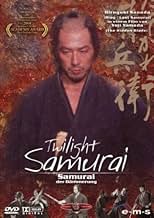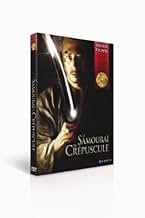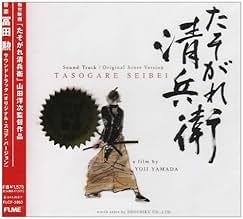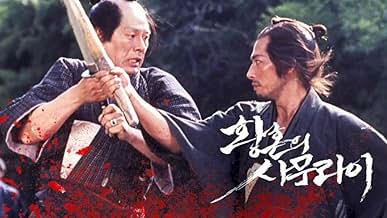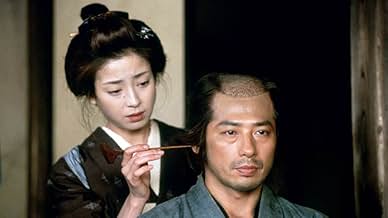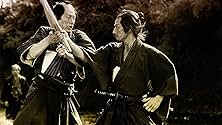Als die Ära des feudalen Japans sich dem Ende zuneigt, hat ein verwitweter Samurai Schwierigkeiten, die Loyalitäten der Clans, zwei junge Töchter, eine betagte Mutter und das plötzliche Wied... Alles lesenAls die Ära des feudalen Japans sich dem Ende zuneigt, hat ein verwitweter Samurai Schwierigkeiten, die Loyalitäten der Clans, zwei junge Töchter, eine betagte Mutter und das plötzliche Wiederauftauchen seiner Jugendliebe auszugleichen.Als die Ära des feudalen Japans sich dem Ende zuneigt, hat ein verwitweter Samurai Schwierigkeiten, die Loyalitäten der Clans, zwei junge Töchter, eine betagte Mutter und das plötzliche Wiederauftauchen seiner Jugendliebe auszugleichen.
- Regie
- Drehbuch
- Hauptbesetzung
- Für 1 Oscar nominiert
- 38 Gewinne & 9 Nominierungen insgesamt
Empfohlene Bewertungen
Sanada plays Seibei Iguchi, a poor, 50-koku ranked samurai who has to support his two daughters and a senile mother, due to the passing away of his wife. The structure and plot turns of the story are simple, but fascinating to watch unfold, and it is perhaps the simplicity and novelistic grace of the narrative that makes the film so remarkable. Seibei works as a scribe with his fellow samurai, and always has to rush home after work to attend to his duties as a father. He lets hygieine slowly slide into second priority (resulting in rather unkempt clothes and socks), but in general, he doesn't seem to care: his two daughters he treasures above all other things. When a woman named Tomoe, a childhood friend that Seibei was particularly fond of, suddenly re-appers into his life, Seibei makes certain decisions that he ultimately ends up regretting later. The rest of the story is full of very interesting plot develoments, playing with the audience's expectations (especially with the relationship between Tomoe and Seiebi), and although the film is not a traditional samurai film in that it does not have alot of action scenes, the composition of the tale, and its "storytelling" invocation (one of the daughters narrates) is good enough to keep you watching.
Hiroyuki Sanada playing Seibei is really a marvel to watch; he adds a very sensible depth and modesty to the character, and infuses it with some understated comic acting as well. At the end of the film, after the climatic final battle, Sanada is able to make the character of Seibei resonate with a very unconventional but nonetheless strong and beautiful heroism. Sanada is really a very talented thespian, and in this film, you may get to sample the sheer range of his great technique. For the world-class acting work he did in this film, he won a Japanese Academy Award, and the film also got noticed by the Oscars (nominated for Best Foreign Language Film, 2004). If there's a chance your able to catch this film in a local theatre (usually, it plays at Landmark) do so, you won't regret it. You'll be able to watch an excellent story unfold, and also see some of the finest acting in world cinema today.
I don't have a top ten list of all time favorite films but if I did Twilight Samurai would be on it. Nominated for best foreign film the same year that the Hollywood film the last samurai got a few nominations it is impossible not to compare the two. While I enjoyed the Last Samurai and it's message of questioning western cultural imperialism Twilight Samurai is a film on whole different level.
LS is a bloated Hollywood epic that delivers intense battles with huge numbers and a unrealistic unsatisfying bullshit love story. Do we really believe that the woman who lost her husband to Tom Cruise the smelly drunk white would fall in love with him?
Twilight Samurai is the opposite in everyway and in everyway it is a better film that is bound to move to tears the hardest of yall out there. It is the story of a petty samurai who after the long lingering death of his wife finds himself become a devoted father.
When Twilight comes and the other samurai go out to drink, he rushes home to clean the house, tend the field and care for his daughters. He has lost track of his imagine, he smells and all he cares about is what is best for his daughters.
When his childhood crush returns and revolution looms this petty samurai is forced into confronting his status as a samurai. Unlike last samurai the small battle between two samurai's at the end is more emotionally involved that any CGI enhanced battle could ever be. The romance in the film is so sweet, tender and believable that is makes the film special.
This could not be as special as it is without excellent acting, direction and above all writing. Holy crap see this movie.
Seibei (a mesmerising less-is-more turn from Hiroyuki Sanada) is a low-ranking widowed samurai with a senile mother and two daughters, working in the castle's stores and taking in piecework to get by.
Grief at his wife's death has led him to turn his back on violence but he is confronted with it nonetheless, firstly as a result of the return of a childhood friend for whom he has strong feelings and who is fleeing her abusive marriage and, finally, when the politics of the day overtake his clan and he is ordered to carry out an assassination.
Seibei's struggle is not for outward respect but to find integrity within a social order over which he has no influence, making the bursts of violence all the more jarring.
Yamada's film is rightly compared to Kurosawa's work and its thoughtful, lyrical tone and themes resonate powerfully.
'Twilight Samurai' is a very sweet film. Sorry, those words, sweet and samurai, may not be used together too much but believe it! With luck, 'The Last Samurai' was just that for Hollywood but please Jollywood bring on more of these.
'Tasogare Seibei' is a story about a low-level Samurai family headed by a widower raising two daughters and his mother who's lapsing into senility. What little action in this film shows how far Seibei (Hiroyuki Sanada) has drifted from his professional prowess. He earns his keep as a scribe and an insect trap maker. When he is called on to defend the honor of his clan, his skill is resurrected although his heart is not in it.
Beautifully filmed and dramatically staged, 'Twilight Samurai' will amuse, dazzle and delight you. Told from the perspective of his daughter reflecting on her life with father, this sentimental tale has the feel of allegory and even novices to this genre will enjoy it. My only criticism is the abrupt ending without a clear resolution. And my lack of Japanese language skills distracted me from this well-acted, set and costumed film.
Just another reason to learn the language.
Wusstest du schon
- WissenswertesOfficial submission of Japan for the 'Best Foreign Language Film' category of the 76th Academy Awards in 2004.
- PatzerWhile Seibei fighting with Toyotaro, Toyotaro katana fell on the ground, right beside Seibei. Toyotaro fell towards river and Seibei make step forward towards Toyotaro, so the katana clearly should stay behind Seibei, beyond possibility to reach by Toyotaro. But from different camera can be seen that katana lay between both of them, 2 meters ahead of Seibei. It's most likely intentional arrangement by director, otherwise Toyotaro wouldn't be able to made his last attempt to grab katana.
- Zitate
Kayano Iguchi: Father, If I learn to do needlework someday I can make kimonos. But what good will book learning ever do me?
Seibei Iguchi: Well, it probably won't ever be as useful as needlework. But you know, book learning gives you the power to think. However the world might change, if you have the power to think you'll always survive somehow. That's true for boys and for girls. All right?
Kayano Iguchi: Yes.
- VerbindungenFeatured in The 76th Annual Academy Awards (2004)
- SoundtracksKimerareta Rhythm
Performed by Yosui Inoue
Top-Auswahl
- How long is The Twilight Samurai?Powered by Alexa
Details
- Erscheinungsdatum
- Herkunftsland
- Offizielle Standorte
- Sprache
- Auch bekannt als
- The Twilight Samurai
- Drehorte
- Produktionsfirmen
- Weitere beteiligte Unternehmen bei IMDbPro anzeigen
Box Office
- Budget
- 5.000.000 $ (geschätzt)
- Bruttoertrag in den USA und Kanada
- 559.765 $
- Eröffnungswochenende in den USA und in Kanada
- 8.573 $
- 25. Apr. 2004
- Weltweiter Bruttoertrag
- 7.372.769 $
- Laufzeit2 Stunden 9 Minuten
- Farbe
- Sound-Mix
- Seitenverhältnis
- 1.85 : 1
Zu dieser Seite beitragen



